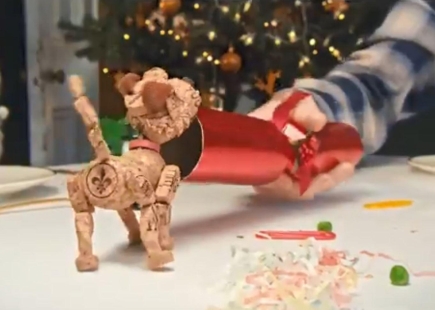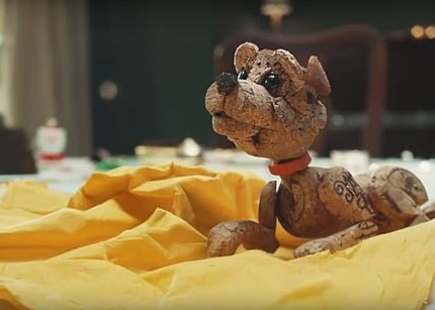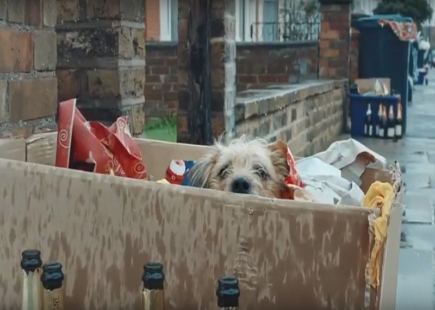A dog may be for life, but this Dogs Trust ad probably won’t stand the test of time

The Background
We have a dog.
It’s a recent thing. In fact, it’s only been four weeks although it already feels like he has been with us forever. Truth be told I wasn’t keen. But over the weeks and months of relentless dog pics, videos of Chloe Mae (Alisha Marie’s dog, for what it’s worth) and a decent pitch around the many therapeutic benefits, I relinquished. But a line was drawn. We would only get a rescue dog.
Cue kid meltdown. Gone were the dreams of replicating Mae’s 450k followers on Instagram. We were never going to have memories of cuddling a malshi, shih-poo or a shitzu. There would be no combing of long cockapoo locks in our house. Why? Because cute dogs rarely get rejected and, if they are, they’re snapped up faster than shih-poos for a grand a pop from a Welsh puppy farm.
“A dog is for life, not just for Christmas” became our mantra.
After all, we’d grown up with the line and so would our kids. Someone at the Metro once wrote that “a slogan is for life and not just for Christmas” and boy were they right. The original slogan was written in 1978 by the then head of PR, Clarissa Baldwin OBE, who went on to become CEO of Dogs Trust, the line is a perfect embodiment of the brand.
Back then a boom in pet shops meant thousands of dogs were being cast out onto streets as people instantly regretted their impulse purchases. The National Canine Defence (as it was then known) had to do something, but it had little to zero funds. “I was asked to go away and think about how we could encapsulate our work with a message that was succinct, in a very cheap way,” said Clarissa. Kicking ideas around with her husband over a few glasses of wine and immortality was created.
What They Did
The picture from the 1970s is sadly much the same today.
The Dog’s Trust says it receives a call every six minutes from someone wanting to get rid of their dog and the picture worsens towards Christmas.
Their research revealed in the run up to Christmas, internet searches for puppies increases by 44% and “get a dog” goes up by 27%. As their CEO, Owen Sharp, rightly pointed out, “it’s very easy to pick a puppy at the click of a button but dogs don’t come with a gift receipt.”
The new 60-second TVC from And Rising revolves around the idea that dogs are thrown away like rubbish. It features a puppet puppy made from cork. Probably from the bottle of Woëf Imperial we see in the opening shot. Set to a Sam Smith cover of “Have Yourself a Merry Little Christmas”, the puppy is at the centre of everyone’s hearts before being unceremoniously thrown away with the rest of the rubbish. At this point the puppy turns into a real dog and is rescued by Dogs Trust.
The Big Idea
The message is always the same but, each year, the story requires a refresh.
“Dogs are thrown away like rubbish” is a clear and simple concept and it works.
Critically it is also in harmony with the slogan.
But is it a “heartbreaking” and “harrowing” treatment as has been reported?
Did it move me and the kids to tears? Sadly not.
The transition from the 28 seconds spent on depicting puppy play wasn’t hard hitting enough. The dog appearing out of the bin had all the hallmarks of a David Walliams novel rather than Michael Morpurgo. Too happy, too quick, too clean and too friendly.
Where were the heart-wrenching, sorrowful eyes of a rescue dog? Eyes that tell a thousand stories of neglect, abuse and the insensitivity of humankind.
Pathos is the unwavering ally of the Dog’s Trust and it should have been heaped on the campaign like dollops of cream on a Christmas pudding.






In Hindsight
Spending half the ad showcasing the animation made the story unbalanced.
If they’d cut that down and increased the time and raw emotion of a dog on the streets before being found it would have delivered a far bigger emotional punch.
But it’s a still one of the best slogans around.
If you enjoyed this article, you can subscribe for free to our weekly email alert and receive a regular curation of the best creative campaigns by creatives themselves.
Published on:


